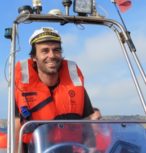DNA reveals the past and future of coral reefs
New DNA techniques are being used to understand how coral reacted to the end of the last ice age in order to better predict how they will cope with current changes to the climate. James Cook Univer

From 2005 to 2022, the main node of the ARC Centre of Excellence for Coral Reef Studies was headquartered at James Cook University in Townsville, Queensland (Australia)








Abstract. Coral holobionts, the keystone architects of the coral reef ecosystem, comprise notorious associations between an invertebrate host and both eukaryotic and prokaryotic microbes. These provide crucial services to the coral host, covering its nutritional and immunity needs, and therefore contributing to its ecological dominance in tropical shallow oligotrophic waters. Here, I will focus on several case studies to illustrate the degree of integration and interdependence established between corals and their symbionts. At the interface between the host epithelium and the seawater environment, coral surface mucus supports a microbial community that acts as barrier against a wide range of pathogens. Findings suggest a selective role of mucus carbohydrate fractionation in the response of the associated prokaryotic community. I will also show that the fate of the coral holobiont upon external disturbance relates to the degree of disruption of its mucus microbial community, with recovery being dependent on the persistence of an intact beneficial microbiome. I will also explore the biochemical variation and the dynamic response of microbial communities inhabiting the gastrovascular cavity of corals upon feeding activities of the host to elucidate on the fairly unexplored microbial ecology of this semi-closed environment. At last, I will touch on a few examples of particular adaptations of the coral microbiome to the mesophotic reef environment. By jointly presenting this series of recent findings originating from different compartments of the coral holobiont, I highlight the complex but deterministic nature of interactions established between corals and their microbial symbionts.
Biography. Pedro Frade is a postdoctoral researcher at the Centre of Marine Sciences (CCMAR) at the University of Algarve (Portugal). His research focuses on the microbial ecology of coral reef ecosystems, in particular the functional roles played by coral-associated microbial communities belonging to the three domains of Life in the niche diversification and adaptation of their coral hosts. Pedro uses field and laboratorial approaches based on molecular biology and biogeochemistry to investigate the microbiome’s functional diversity in auto- vs heterotrophic corals, across shallow vs mesophotic reefs, and for tropical vs temperate coral hosts. He completed a PhD at the University of Amsterdam in the Netherlands and conducts most of his field research based at the fieldstation of CARMABI Foundation on the South Caribbean island of Curaçao.
New DNA techniques are being used to understand how coral reacted to the end of the last ice age in order to better predict how they will cope with current changes to the climate. James Cook Univer
A new study on the effects of climate change in five tropical countries has found fisheries are in more trouble than agriculture, and poor people are in the most danger. Distinguished Profess
James Cook University researchers have found brightly coloured fish are becoming increasingly rare as coral declines, with the phenomenon likely to get worse in the future. Christopher Hemingson, a
Researchers working with stakeholders in the Great Barrier Reef region have come up with ideas on how groups responsible for looking after the reef can operate more effectively when the next bleaching
Abstract: As marine species adapt to climate change, their heat tolerance will likely be under strong selection. Individual variation in heat tolerance and its heritability underpin the potential fo
Abstract: The Reef Ecology Lab in KAUST’s Red Sea Research Center explores many aspects of movement ecology of marine organisms, ranging from adult migrations to intergenerational larval dispersal
Abstract: Macroalgal meadows are a prominent, yet often maligned component of the tropical seascape. Our work at Ningaloo reef in WA demonstrate that canopy forming macroalgae provide habitat for ad
Abstract: Sharks are generally perceived as strong and fearsome animals. With fossils dating back at least 420 million years, sharks are not only majestic top predators but they also outlived dinosa
Abstract: Connectivity plays a vital role in many ecosystems through its effects on fundamental ecological and evolutionary processes. Its consequences for populations and metapopulations have been
Abstract: Evolution of many eukaryotic organisms is affected by interactions with microbes. Microbial symbioses can ultimately reflect host’s diet, habitat range, and even body shape. However, how
Abstract: The past few years have seen unprecedented coral bleaching and mortality on the Great Barrier Reef (GBR) but the consequences of this on biodiversity are not yet known. This talk will expl